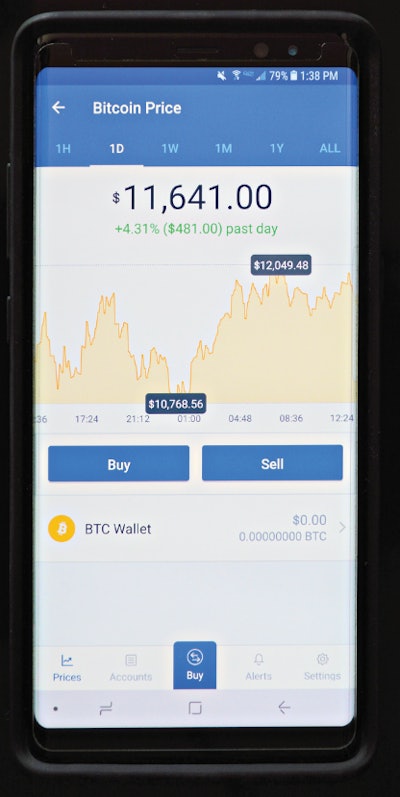
I have to admit, as I researched Bitcoin for this article, I was tempted to write a piece on its fascinating history, which is full of mysterious identities, white collar crimes, and tales of missing money (Google "Mt. Gox"). But the focus of this article is understanding Bitcoin as a potential investment.
What is Bitcoin?
Bitcoin is a cryptocurrency, which means it's digitally encrypted for privacy and security. It was invented in 2008, purportedly by Satoshi Nakamoto, whose identity is controversial (part of the fascinating history). Bitcoin isn't regulated by any government or central banks. It's part of a peer-to-peer network, meaning it's a currency that transfers directly from person to person with no third party to facilitate or govern the exchange. This is a revolution in currency, which has regulators unsure of how to handle it.
Bitcoin, along with the technology behind it called "blockchain," is so new, nobody seems to fully understand it or really know where it's going in the future. It's arguable that those putting their money in Bitcoin aren't so obsessed with the currency itself, but rather believe strongly in the future of blockchain technology.
What is Blockchain Technology?
A blockchain is a continuously growing list of records, called blocks, which are linked and secured by encryption into a complete ledger, called the blockchain. Each block links to a previous block, and comes with a timestamp and transaction data. Once recorded on a block, the data cannot be altered. An analogy to help understand this is to think of your checking account. Think of your monthly statements as the blocks. Think of your entire account history as the blockchain.
In reference to Bitcoin, the blockchain is a digitized, decentralized public ledger of all cryptocurrency transactions that have ever occurred. It is available to all computers that participate in the Bitcoin network, and can be copied but cannot be altered. In August 2014, the Bitcoin blockchain file size was around 20GB. By January 2017, it had grown to 100GB. You can see how this creates an issue over the long term for information storage. This is one of the problems that will need to be solved for the technology to be successful long term.
Here's a simplified explanation of how blockchain technology works in relation to Bitcoin:
- Someone requests a transaction.
- The transaction is submitted to the peer-to-peer (P2P) network (all the participating
computers). - The network validates the transaction using algorithms.
- Once validated, the transaction is used to create a new block.
- The new block is added to the blockchain and becomes a permanent record.
The idea here is that the data cannot be corrupted, which means you have transparency and accountability. There is no single point of control or failure. Even if several computers in the network were to quit functioning, the blockchain wouldn't be affected.
An automated, electronic ledger like blockchain that doesn't require human involvement has the potential to streamline accounting and make financial operations much cheaper. Having things automated could also speed up the flow of capital, as transactions will no longer need to remain pending for verification, like so many deposits do currently.
Because of its inherent security, this technology holds potential for future use in identity management, medical records, voting, recording historical data, and many other situations.
A World Economic Forum report even predicted that by 2025, 10% of global GDP would be stored on blockchain technology. In fact, IBM and Comcast are investing in startups utilizing and promoting blockchain technology.
 Various "wallets" are used for storing Bitcoin and other cryptocurrencies. Photo: Aaron Strain
Various "wallets" are used for storing Bitcoin and other cryptocurrencies. Photo: Aaron Strain
Is Bitcoin a Good Investment?
First, we need to define what an investment is, and distinguish investing from speculation. For purposes of this article, I'll use Benjamin Graham's (Warren Buffett's mentor) definition from his book, Security Analysis:
"An investment operation is one which, upon thorough analysis, promises safety of principal and a satisfactory return. Operations not meeting these requirements are speculative."
So the question you have to ask yourself about Bitcoin is: Does this promise safety of my principal and a satisfactory return? Let's look a little further into this...
Cryptocurrency, and therefore, Bitcoin, has no intrinsic value and no physical form. You put your money into Bitcoin with no predictability of what you'll get out. You're operating on the hope that when you decide to sell, the market value of Bitcoin will be higher than when you decided to buy. That's not investing, it's speculating.
Contrast that with buying shares in a long-standing company like Coca-Cola, Verizon, or IBM. You own a portion of the business and receive dividends when the company profits. When you buy Bitcoin, you're not purchasing equity in an enterprise, so you don't receive a dividend. Also, when you own shares in a company, you can calculate your investment's true value based on things like revenue, expenses, earnings per share, and outstanding shares. Bitcoin has none of these attributes and its price on the market is wildly volatile, meaning you never really know the value of what you own, because it fluctuates from minute to minute.
More than once, Warren Buffett has advised never to put money into something you don't understand. Yet, because of the buzz and recent rallying price, lots of people are putting money into Bitcoin without understanding it. This is speculation, driven on the emotion of excitement and fear of missing out. It's dangerous operating like that. When it comes to speculation, you should only risk capital of which you can afford to lose 100%.
This article is simply my effort to help you be a little more informed, and there's much more to read and research if you want to understand Bitcoin. Do your due diligence, become knowledgeable in what you put your money into, and make sure you can afford to lose what you're risking.
A 15-year veteran of law enforcement from the Kansas City area, Adam Doran is now a fulltime financial advisor who focuses on helping police officers achieve their financial goals. You can email him directly at adam@copfinance.com.
